
What Buildings Do: An architecture podcast.
By Story, Building

What Buildings Do: An architecture podcast. Jul 01, 2020

41. Reimagining Elderhood 1 | Ailbhe Cunningham + Inka Drohn
.
The podcast we recorded on zoom in October 2023.
.
Graphic design by Eamonn Hall
.
Music by Sinéad Finnegan
.
What Buildings Do is supported by the Irish Architecture Foundation as part of their commitment to advancing the culture of architecture in Ireland.

40. Luke McManus | North Circular
In this podcast, Emmett Scanlon talks to Luke McManus, a documentary film maker based in Dublin.
Luke's debut feature documentary as a director, North Circular, had its International Premiere at Sheffield Doc/Fest in 2022 and won awards at Dublin IFF, Louth IFF and IndieCork Film Festival. It recently won a prestigious Grand Prix at France’s biggest documentary festival, FIPADOC in Biarritz in southwest France. North Circular is currently screening in cinemas across Ireland and in London and has had many sold-out screenings and excellent reviews - the Guardian's Peter Bradshaw awarded it four stars and said it was "resonant, vivid and beautifully shot, pregnant with images and ideas, a film made with real artistry."
_
_
The music is by Sinead Finnegan and is played by The Delmaine String Quartet. The podcast was recorded on zoom in January 2023.

39. Valerie Mulvin | Group 91
In this episode we talk to Valerie Mulvin. The podcast is part of the Temple Bar 30 Series, an ongoing recording project with members of Group 91. Back in the 1980s a group of young and eager architects began working together in a loose collective, anxious to make things happen in Dublin city. By 1991, this group formalised as Group 91 and contained among others, Shelley McNamra, Yvonne Farrell (Grafton Architects), John Tuomey and Sheila O Donnell, Mc Cullough Mulvin architects and McGarry NiEanaigh. Valerie was part of G91 with Niall McCullough, who died in 2022. As practitioners and writers in and of architecture, Niall and Valerie have published since very early in their career. The podcast begins then, with Valerie reflecting on how and why the desire to research, write and publish came from and how she and Niall sustained this across their entire career. Valerie has just published Approximate Formality: Morphology of Irish Towns to public and critical acclaim and she is now working to complete a book underway by Niall before his death. With a mood and tone of reflection and optimism, Valerie looks back at how she and Niall became involved in G91, and their early research and study trips, their meetings with Aldo Rossi and their first book A Lost Tradition, all of which fundamentally formed their lives in architecture. She reflects too on the impact and legacy of the Temple Bar project, on Dublin, culture, policy and their own individual practice.
_
The music is by Sinead Finnegan and is played by The Delmaine String Quartet. The podcast was recorded live at Valerie's home in August 2022.

38. Adam Nathaniel Furman
In this episode Emmett Scanlon talks to Adam Nathaniel Furman. Adam is a British artist and designer of Argentine and Japanese heritage based in London. Trained in architecture, Adam's atelier works in spatial design and art of all scales from video and prints to large public artworks, architecturally integrated ornament, as well as products, furniture, interiors, publishing and academia.
_
As an activist, vocal defender of workers rights, particularly those of interns, and as an articulate speaker on and about architecture and design, there were many reasons to talk to Adam but it was the arrival of the book Queer Spaces edited by Adam and Joshua Mardel, and designed by Alex Synge, that finally prompted the talk.
_
A book that is long overdue, it provides an accessible atlas or canon in Adam’s words - of queer spaces, in part for queer students of architecture and design needing a frame of reference and references to support their work. But discussing the book also lead to conversations about Adam’s own work, his experience as a queer designer, the challenges he has faced in practice, what he witnessed and reacted to in his architectural education, and what now might his new, true passion.
_
When in Dublin, Adam gave a dense, intelligent, lucid and often funny lecture at the invitation of the Architectural Association of Ireland and the conversation begins discussing his first visit to Dublin and if humour was always part of his lecture repetoire. A trigger warning though, Adam does discuss forms of bullying in education and at times is deeply honest about his own experiences.
_
ABOUT ADAM
Adam is a British artist and designer of Argentine & Japanese heritage based in London. Trained in architecture, Adam's atelier works in spatial design and art of all scales from video and prints to large public artworks, architecturally integrated ornament, as well as products, furniture, interiors, publishing and academia.
Adam's work has been exhibited in London, Paris, New York, Milan, Melbourne, Rome, Tel Aviv, Mumbai, Vienna & Basel, amongst other places, is held in the collections of the Design Museum, the Sir John Soane’s Museum, the Carnegie Museum of Art, the National Gallery of Victoria, the Abet Museum, and the Architectural Association, and has been published widely.
The atelier has completed, and ongoing projects both internationally (Europe, the US, S America, the Middle East, East Asia) and in the UK. Adam has lectured at the RIBA, Harvard GSD, UC Berkeley, the Carnegie Museum of Art, the Vitra Design Museum & the Casa dell’Architettura Rome, amongst others, has taught courses at several universities as well as having been Studio Master of Productive Exuberance at Central St Martins in London, is co-director of Saturated Space at the AA (an influential research group on colour in Urbanism and Architecture), is a published author, a vocal advocate for diversity and representation in architecture, urbanism and design, and has been a judge for the Dezeen and FRAME awards, amongst others.
ABOUT THE PODCAST
What. Buildings Do is part of Story, Building, the independent platform for the critical discussion of architecture, based in Ireland. Foreign Exchange: Conversations on Architecture Here and Now is the first publication, available here.

BONUS: Review: I see earth, an exhibition by Tom dePaor
This is a bonus episode of the podcast. It is a review of and a reflection on i see Earth, building and ground 1991-2021 an exhibition by Tom de Paor. The recording of this text was first broadcast at an event in VISUAL Carlow, on May 1st 2022, at an event called MAYDAY, a 108 minute orbit around the earth, curated by Nathalie Weadick and Hugh Campbell. The text read here will also be published on storybuilding.ie. “Still open, i see Earth presents an ambitious large-scale installation of sculptural work by one of Ireland's foremost architects, Tom dePaor. The exhibition spans his practice from 1991-2021 through the media of sculpture, objects, film and drawing, painting and writing. Curated and commissioned by Nathalie Weadick and including new documentary work by Peter Maybury, i see Earth is produced by VISUAL Carlow and the Irish Architecture Foundation.

37. Ellen Rowley
ABOUT ELLEN ROWLEY
Ellen Rowley is Assistant Professor in Modern Irish Architecture at the School of Architecture, Planning + Environmental Policy, UCD. She is an architectural and cultural historian, a teacher and a writer. Interested in architectural obsolescence, the intersection of social histories and buildings, and the place of the Catholic Church in Ireland’s built environment, she has published extensively including Housing, Architecture and the Edge Condition (2019, Routledge, Taylor + Francis); and (co-editor), Making Belfield. Space + Place at UCD (2020, UCD Press); as well as More Than Concrete Blocks, volumes 1 and 2 (2016/9, Four Courts Press) which are socio-cultural histories of Dublin’s buildings from 1900 to 1972. Volume 3 is currently under production.
Before that she was co-editor of the landmark Yale series, Art and Architecture of Ireland (Volume 4, Architecture 1600 – 2000, YUP/RIA, 2014), Generally, this history is pioneering and so, she admits, there are mistakes. In 2017, Ellen was awarded Honorary Membership of the Royal Institute of Architects of Ireland, for services to Irish architecture. Being privileged with an education from Trinity College Dublin and Cambridge University, UK, Ellen is an advocate for access to university education and specifically, the need for widening participation in architectural education.
CREDITS:
What Buildings Do is part of Story, Building the platform for the critical discussion of architecture in Ireland. Music is by Sinead Finnegan, design is by Eamonn Hall. The What Buildings Do logo is based on an enamel tile made by Livia Hurley. The podcast was recorded LIVE in March 2022.

36. Story, Building is here.
In this short episode Emmett Scanlon describes the origins and purpose of the new platform Story, Building. The podcast, What Buildings Do, is now part of that platform. Story, Building is a new platform for the critical discussion of architecture in Ireland. The podcast also shares information on how to submit work for publication in print or online. Full details are on the website. Music is by Rachael Lavelle.

35. Derek Tynan | GROUP 91
This is a the second in a series of conversations about Temple Bar with the architects of Group 91, initiated on the 30th anniversary of that project. Part reflection and projection, in this episode architect Derek Tynan talks about arriving back to Dublin the 1980s, then, he calls, a city of decay He recalls how then a new culture of confidence of architecture took hold in Ireland; Group 91 got going and got the gig; he reflects on how G91 could not exist now; the perennial issue of procurement; and how housing is being designed today.
_
The music is by Sinead Finnegan and is played by The Delmaine String Quartet. The podcast was recorded on zoom in November 2021.

34. BOOK REVIEW | The Dublin Architecture Guide+The Dignity of Everyday Life
ABOUT THE CRITICS
David Capener is an architect, educator and writer and a lecturer at the Belfast School of Architecture. He himself has just published a book as part of ANNEX, a six person team who made ENTANGLEMT, the national pavilion at the 2021 Biennale of architecture in Venice. The book, STATES OF ENTAGLEMENT: Data in the Irish Landscape, is published by ACTAR and designed by Alex Synge.
Noel Bowler, who studied at the Belfast School of Art and is currently Senior Lecturer in Photography at the University of Suffolk.
Noel Bowler is a photographer and educator. His photographs, exhibitions and publications continue to look at the ongoing consideration of the political forces that shape our world, reflected through the organisation of social space. Made over a six year period, Noel’s most recent book ABOVE THE FOLD is a series of photographs taken in some of the most respected and recognised newspaper newsrooms from around the world. The book was designed by Robert Farrelly at POST STUDIO and published by RARE editions.
NOTE:
The podcast was recorded on zoom. During the course of the recording there was some local distortion on some aspects of the sound. We apologise for this and have done our best to correct this. Music in this podcast is by Rachael Lavelle.

33. Part W Collective | Zoë Berman
In this episode host Emmett Scanlon speaks to Zoë Berman of Studio Berman. Zoë is an architect and a university lecturer. She has lectured on design and equity, and written for the RIBA Journal, Blueprint magazine and Architecture Today. Zoë is also one of the founding members of the Part W Collective, which describes itself as “a collective of engaged and proactive women working in design education, architecture, planning, engineering, policy, infrastructure and sustainability."
Founded in 2018, the collective says it is intergenerational - "formed by women from diverse backgrounds who are working together to call time on gender inequality, in all its forms, in our built environment."
In the podcast Zoë talks about the work of Part W, in particular the alternative list campaign, their first campaign and one which simply asked, if we did not have the list of men who had previously won the Royal Institute of British Architects Royal Gold Medal, who would be on that list? Who were the architects who were women who had been overlooked, forgotten or ignored? From there we discuss more broadly the challenges faced by women working in the built environment and architecture.
Members work in the areas of architecture, project management, place making, sustainable transport, design eduction and journalism - and include Christine Murray, Dr. Harriet Harriss, Hilary Satchwell, Kelly Clark, Sarah Castle, Sarah Wigglesworth, Yemi Aladerun, Sarah Ackland, Nadine Adamski and Fiona MacDonald and we work in friendship with multiple volunteers and supporters.
ABOUT:Zoë Berman is an architect, university lecturer and founder of Part W – an action group founded in 2018 that campaigns for gender equality across the built environment sector. Zoë is director of Studio Berman, has lectured extensively on design and equity, and written for the RIBA Journal, Bluep;rint magazine and Architecture Today. She is a Design Council Expert and member of the Oxford Design Review Panel. Zoë is writing a book profiling women who are shaping the design of cities.
Portrait photo: Morley von Sternberg

32. Soil Lab
In the podcast Emmett Scanlon talks to James Albert Martin and Eibhlín Ní Chathasaigh, who together with Anne Dorthe Vester and Maria Bruun are Soil Lab. In September 2021, Soil Lab unveiled their installation on a vacant lot in Chicago as part of the Chicago Architecture Biennial.
In the podcast the pair discuss the project from the initial idea which, after an open call from the Danish Arts Foundation, was to make a housing for a ceramic kiln on the site, and all the way through to the opening. They share the obvious logistic challenges of making a project like this from Denmark and Ireland and in America, especially during a pandemic. However, challenging as it was, it is clear the team remain enthused, emboldened and engaged with and by the work and all that unfolded day by day across the project, and in particular how the project was enriched by the participation of residents and others who live and work adjacent to the site. James begins by telling us about the Chicago Architecture Biennial and from their pair talk directly and honestly about what happened, what they learned, and a little about what might be next.
More about the project here: https://www.instagram.com/soillabnorthlawndale
ABOUT SOIL LAB
The Soil Lab project team is made up of three architects, James Albert Martin, Eibhlín Ní Chathasaigh, and Anne Dorthe Vester, and one designer, Maria Bruun, working across different scales, materials, and disciplines. James, Eibhlín, and Anne Dorthe studied together at the Aarhus School of Architecture in Denmark and have since collaborated on several projects. James and Eibhlín are based in Dublin, where they have both worked for internationally renowned architecture firms. Maria and Anne Dorthe are based in Copenhagen, where they founded the studio MBADV in 2013. Their practice with MBADV is at the intersection of architecture, design, and fine art. The project team comes together around a belief in making as a collaborative act: making moments, and making spaces and places for people to gather, to celebrate, and to treasure space.
Eibhlín Ní Chathasaigh graduated from the Aarhus School of Architecture, Denmark, in 2011. Since graduating she has worked for Atelier Peter Zumthor in Switzerland and Grafton Architects in Dublin, Ireland. In 2018, Eibhlín joined James and Anne Dorte in participating in the REFORM Design Biennale with their collaboration Woven Construct, constructed in the garden of Munkeruphus Center of Contemporary Art, in Zealand, Denmark. Eibhlín believes imagination is the central strength of architecture and is interested in the social act of architecture and design as a collaborative conversation. It is with great pleasure that, together with the people of North Lawndale and the Soil Lab team, she embarks on transforming a vacant lot in West Chicago into a new public space.
James Albert Martin is a registered architect with the Royal Institute of the Architects of Ireland and Grade 3 Accredited in Architectural Conservation. He has taught at The Aarhus School of Architecture and at University College Dublin where he is currently a Design Fellow. James is interested in the act of making, and his work is informed by this collaborative act. James holds a MA from The Aarhus School of Architecture and has also undertaken courses in joinery at Capellagården - a school for craft and design. Since graduating he has worked with international studios; Sou Fujimoto Architects, Herzog & de Meuron, and Grafton Architects. In 2018, James, Eibhlín, and Anne Dorte participated in REFORM Design Biennale with their collaboration Woven Construct, a seat, a screen, space, which they constructed in the garden of Munkeruphus, north of Copenhagen.

31. Ryan W. Kennihan
In 2021 Ryan Kennihan was Highly Commended for a house in north Dublin, in the 'New Into Old' awards, by the Architectural Review. This house is another in a series of lauded house projects undertaken by Ryan and his team in RKA over the last 15 years of practice. In the podcast we begin with that house, exploring how to work with fragments of existing buildings, returning them to a family for use today and into the future. Ryan talks about building trust with clients, working with building contractors, his interest in the existing or as found, the ideas of continuity in architecture, and the ethical position of the architect. The podcast also covers Ryan's views on the culture of architecture in Ireland, and what Ireland offers that many places do not. About to launch their first book on work to date, Ryan concludes by sharing with us a building that continues to surprise him and inform his work in architecture.
About Ryan Kennihan:
Ryan studied architecture at Cornell University. Originally from Chicago, he has been based in Dublin, Ireland since 2002, establishing his practice in 2007. He has taught architecture at University of Navarra in Pamplona, the Porto Academy, University College Dublin and the Dublin School of Architecture at TU Dublin where he is currently a lecturer. Ryan is a registered architect with the Royal Institute of the Architects of Ireland and Grade 3 Accredited in Architectural Conservation.
The podcast was recorded on ZOOM in August 2021 \ Music is by Sinead Finegan \ played by the Delmaine String Quartet.
Architect portrait by Al Higgins.
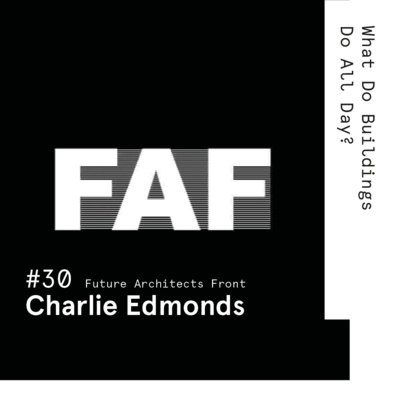
30. FAF: Future Architects Front | Charlie Edmonds
The last years have seen a growing consideration of the terms and conditions of employment for architects. In this episode Emmett Scanlon speaks to Charlie Edmonds who cofounded in 2021 the Future Architects Front, a group founded to end "the exploitative practices" of workers in architecture. Charlie outlines the reasons he and Priti Mohandas founded the group, their engagement with the Royal Institute of British Architects (RIBA), he calls for more diversity in education available to architects and how discussions of preparing students for the "real world" in architecture education are often about holding the status quo and resisting change. |
About FAF: Future Architects Front is a grassroots organisation of architectural workers and students. FAF campaigns to end the exploitative practices that have come to define the world of architecture. It was created and is run by Charlie Edmonds and Priti Mohandas, British designers and researchers. The pair met and began the work of FAF while conducting their Master’s in Architecture and Urban Design at the University of Cambridge. |
Music is by Sinead Finegan, played by the Delmaine String Quartet (Philip Dodd, leader). The podcast was recorded on Zoom in July 2021.
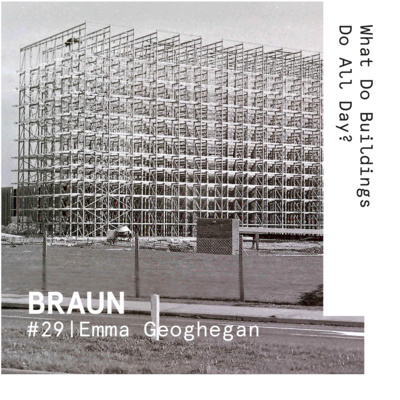
29. BRAUN | Emma Geoghegan
_
Photo of BRAUN under construction: Dermot O Brien, used with permission.
ABOUT EMMA GEOGHEGAN
Emma Geoghegan is an architect, urban designer and lecturer at the Dublin School of Architecture TU Dublin. Since 2007 her practice has focused on the design of beautiful, resilient, buildings and places for people with a broad range of abilities and needs. In parallel her research and teaching practice has been driven by a commitment to the social purpose of architecture and inclusive design principles and embedding these in architectural education.
After graduating from the University of Edinburgh in 2002, Emma completed her professional practice studies at the AA and worked for a large healthcare architecture practice in London. In 2010 she completed an MSc in Urban Design at UCD and from 2007-2017 was a partner in MEME Architecture an award-winning design practice working on projects across the UK and Ireland. Since 2017 Emma has continued to work in collaborative private practice and undertakes consultancy work in the areas of inclusive design and accessibility alongside her role as Chair of the Bachelor of Architecture programme at TU Dublin. She is also currently a Vice President of the RIAI and a board member of Arts and Disability Ireland.
DEDICATION
This podcast is dedicated to Angela Jupe. I met Angela several times over the years and to my shame I did not know she was the architect of this building and I never asked her about it. I regret this, she was a formidable and energetic woman, who made an impact on so many people who met her. She died in her home in Offaly on May 4th 2021 | Emmett Scanlon
__
Music is by Sinead Finegan, played by the Delmaine String Quartet (Philip Dodd, leader).
The podcast was recorded on Zoom in July 2021.
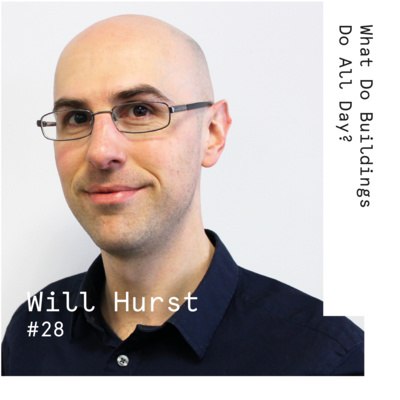
28. RetroFirst Campaign | Will Hurst
In this episode, Emmett Scanlon talks to Will Hurst, the Managing Editor of The Architects’ Journal, based in London. Will has been leading the RetroFirst campaign at the Architect's Journal since late 2019. The podcast covers the origins and ambitions of this campaign, at the heart of which is the idea that "the greenest building is the one that already exists". The conversation touches on the challenges faced by all in construction at a time of climate crisis, the reaction of the architecture profession to RetroFirst, the circular economy and why it makes little climate sense to demolish buildings like the Derby Assembly Rooms in Derby.
_
ABOUT WILL HURST
Will Hurst is an award-winning journalist who has spent his career writing about architecture and construction in the building press and for national titles such as the Guardian, Times and Financial Times. Will has written extensively about the built environment’s contribution to the climate crisis and is currently leading the AJ’s RetroFirst campaign for the re-use of existing buildings. His investigation into the Garden Bridge won him a Press Gazette British Journalism Award in 2017 and was shortlisted for that year’s Paul Foot Award.
__
Music is by Sinead Finegan, played by the Delmaine String Quartet (Philip Dodd, leader).
The podcast was recorded on Zoom in July 2021.
_

27. Annex | ENTANGLEMENT | Venice Biennale 2021
The 17th Venice Architecture Biennale open-end at the end of May, a year later than intended, due to Covid restrictions and cancellations. This year the Irish pavilion, at what is one of the largest exhibitions of architecture in the world, was commissioned and curated by an interdisciplinary group of architects, artists and researchers, together known as ANNEX. The pavilion is called, Entanglement, and it explores the materiality of data, and the interwoven human, environmental and cultural impacts of communication technologies. As you will hear this is a particularly Irish concern right now, with Ireland currently being the data capital of Europe, which, at its simplest terms, is manifest in the sheer number of large data centres being built on the Island. But is far more complex and far more profound than that, and in the podcast you will here this very contemporary concern with data and the cloud, has resonances with our histories of social and public space and implications for the planet’s resources, because the cloud is greedy.
Host Emmett Scanlon speaks to David Capener and Donal Lally, two ambassadors for the six member Annex team. The podcast covers working as part of an interdisciplinary team, the genesis of the pavilion, Ireland as a data capital, the value of exhibitions and the value of the Venice Biennale.
Entanglement is due to tour Ireland in 2022.
About Annex:
Annex is an international multidisciplinary research and design collective, comprised of a core team of
architects, artists, and urbanists, whose work operates between and beyond the subject areas of computer
science, gaming platforms, technology and public space, data centres, sensor technology, and large technical
systems. Members include Sven Anderson, Alan Butler, David Capener, Donal Lally, Clare Lyster and Fiona
McDermott.
Ireland at Venice is an initiative of Culture Ireland in partnership with the Arts Council and in 2021 the
pavilion also has the support of: The Department of Tourism, Culture, Arts, Gaeltacht, Sport and Media;
Royal Institute of Architects Ireland; TU Dublin School of Creative Arts; TU Dublin Graduate School of
Creative Arts and Media; Trinity College Dublin; CONNECT Research Centre for Future Networks and
Communications; University of Illinois at Chicago, Creative Activity Award; Valentia Slate, ARUP, Office of
Public Works and Green on Red Gallery.
David Capener is an architect, critic, writer, academic and educator. He is a researcher at
Technological University Dublin. He has taught on the master’s program at Queens University School of
Architecture and has written for The Irish Times, The Guardian, The Sunday Times and numerous other
print and online publications.
Donal Lally is an architect and principal at zero-degree machine [z-dm], an architecture studio
that operates in areas within and beyond the traditional boundaries of architecture, landscape and urbanism.
Donal is a Lecturer in Design Theory at TU Dublin. Donal’s PhD project, The Posthuman City, explores how
data infrastructures reconfigure human and non-human habitats.

26. Self Organised Architecture | SOA | HOUSING
In this episode Emmett Scanlon talks to Padraig Flynn and Tom O Donnell of SOA (Self Organised Housing). In the podcast the pair outline the origins of the group and the social, spatial and architectural potential of community-led housing. The pair present a realistic but optimistic way of understanding and providing housing in Ireland.
-
About SOA
SOA SOA is a not-for-profit action research think tank, formed in 2017 to research and promote cooperative and collaborative approaches to housing in Ireland. We study proven and successful UK, European and North American strategies and look at how these might be adapted to Ireland. In 2019 SOA hosted a series of events on the subject of Community-Led Housing, including an international conference which was attended by over 400 people. Building on the research base generated by this and other activities, throughout 2020 SOA have coordinated a comprehensive multi-stakeholder study to ‘Roadmap a Viable Community-Led Housing Sector for Ireland’. SOA are also currently the Irish partner in the EU Interreg Sustainable Housing for Inclusive and Cohesive Cities (SHICC) project, which seeks to support the establishment of more successful Community Land Trusts (CLTs) in cities across the North-West European region.
-
About Tom
-
Tom O’Donnell studied architecture at UCD and in 2000 completed an MPhil at Cambridge University under Peter Carl and Dalibor Vesely. He worked at Cork City Architect’s department on a number of public projects until 2007 and since then, has been in practice in Germany and Ireland. In 2017, he co-founded SOA Research CLG, an action research think tank to promote cooperative and collaborative approaches to housing and community development, where he is currently a co-director.
-
On Padraig
-
Padraig Flynn studied architecture in UCD, and currently works in practice with LiD Architecture, an Irish/Berlin architecture and research practice specialising in innovative housing and participative design techniques. Previous work at Cullen Payne Architects (Dublin) and Heren 5 Architecten (Amsterdam) included housing projects at a range of scales in Ireland, London and Amsterdam. Padraig is a founding director of SOA Research, and co-author with Tom of the recently published Roadmapping a Viable Community-Led Housing Sector for Ireland series, which outlines the development of a community-led housing infrastructure for Ireland. Music is by Sinead Finegan and is played by the Delmaine String Quartet. The podcast was recorded on zoom in May 2021.
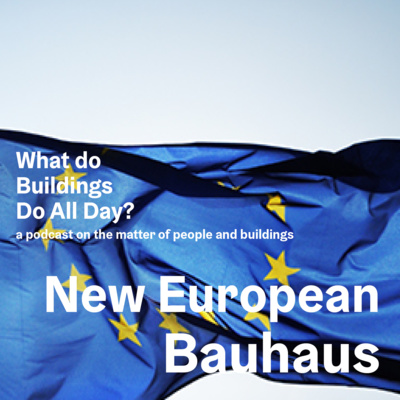
25. NEW EUROPEAN BAUHAUS | Orla Murphy
In 2020 EU President Ursula von der Leyen launched the New European Bauhaus, an initiative intending to address climate by and through design. In this episode architect Orla Murphy outlines the values and workings of this initiative and talks about its potential impacts on architecture, on Ireland and on our shared futures on the planet. The conversation also engages with matters of civic and public space and the use of it by people in towns and cities.
About Orla Murphy.
Orla Murphy B. Arch M. RIAI is a part-time Assistant Professor in the School of Architecture Planning and Environmental Policy (APEP), Co-Director of the UCD Centre for Irish Towns (CfIT), and owner of Custom Architecture. Orla has been External Examiner in CCAE and invited speaker at UL, CCAE, WIT and TUD. In 2018 Orla was Co-Commissioner and Co-Curator of FREE MARKET, Ireland's national representation at the architecture biennale, Venice. In 2020 Orla was appointed to the round-table group for the New European Bauhaus.
Music is by Sinead Finegan and is played by the Delmaine String Quartet. The podcast was recorded on zoom in May 2021.
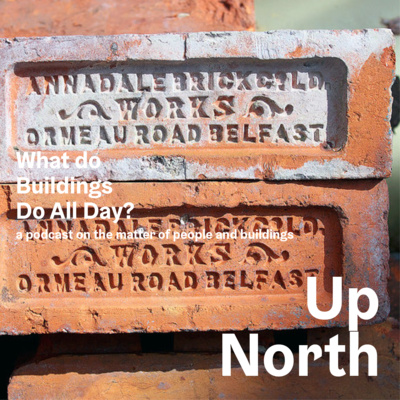
24. UP NORTH | A Conversation on architecture in Northern Ireland
Northern Ireland is 100 years old on May 3rd 2021. In this podcast Emmett Scanlon speaks to four people working in and through architecture in Norther Ireland. Aidan McGrath is a director of McGonigal McGrath architects. Jane Larmour leads ArighoLarmourWheeler architect based in Dublin and Belfast. Aisling Rusk is founder of Studio Idir and Ciaran Fox is the Director of the RSUA (Royal Society of Ulster Architects). What follows is a broad conversation in which individually and collectively the quartet outline their own understands of the current terms and conditions in which architecture is being commissioned, designed, built and finally shared with a public. Naturally the specific political context of Northern Ireland comes up - you will have heard Aidan refer to this in the introduction - and we hear how this might be driving and informing types of architectural practice.
__
Music is by Sinead Finegan, played by the Delmaine String Quartet (Philip Dodd, leader).
The podcast was recorded on Zoom in April 2021.
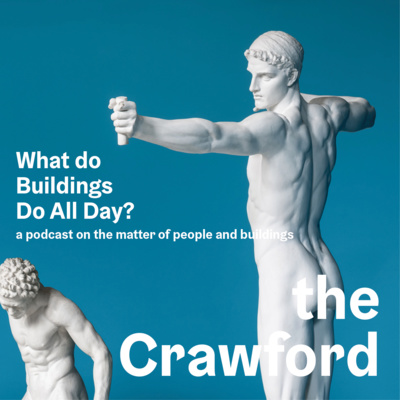
BONUS: The Crawford Gallery
__
Music is by Sinead Finegan, played by the Delmaine String Quartet (Philip Dodd, leader).
The podcast was recorded on Zoom in April 2021.
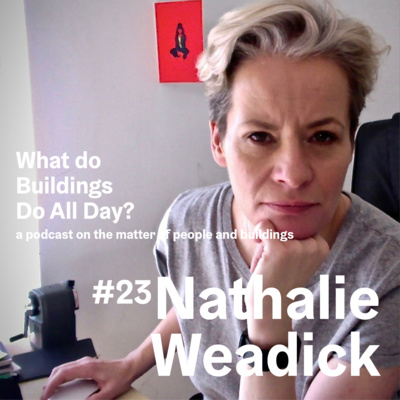
23. Nathalie Weadick | DESIRE
In this episode host Emmett Scanlon meets Nathalie Weadick. Nathalie is the director of the Irish Architecture Foundation (IAF). The IAF is an independent organisation dedicated to the promotion of architecture as culture. In a wide ranging conversation, Nathalie recalls her early career in Visual Arts and as Director of the Butler Gallery in Kilkenny and how she moved into architecture. The conversation covers risk taking, growing a desire for architecture, the impact of public engagement practices and that the time is here for a new "house" for architecture in Ireland. (The podcast was recorded on zoom)
About Nathalie Weadick:
Nathalie Weadick is a curator of architecture and spatial practice based in Dublin. She has been the director of the Irish Architecture Foundation (IAF) since 2007.
Through the IAF she has delivered many initiatives exploring the impact of architecture on society, culture, and history. She initiated the development of a BMX Skate and Play Park, a community-led design project with Dublin City Council, Ballyfermot Community, and architects Relational Urbanism. The framework for this project developed into a national program called Reimagine.
She established the ongoing and successful National Architects in Schools Initiative and produces Open House Dublin, Ireland’s largest architecture festival engaging thousands annually.
From 2013 to 2021 she curated with Arup New Now Next a series of talks in Dublin with David Adjaye, Jeanne Gang, Tatiana Bilbao, Rozana Montiel, Kunle Adeyemi, Workac, Minsuk Cho, Ole Scheeren, Bjarke Ingels, Winy Maas, and Grafton Architects.
2017-2018 she was on the team of assistants to the Curators Shelley McNamara and Yvonne Farrell of the 16th International Architecture Exhibition at Venice. In 2015 she was the Architecture Advisor for Irish Design 2015 and co-curated with Raymund Ryan New Horizon_Architecture from Ireland and presented ten emerging and current Irish practices at the London Festival of Architecture, the Chicago Architecture Biennial, and the Hong Kong/Shenzhen Bi-City Biennale. In 2015/16 she curated We Built This City a series of panel discussions in London, Chicago, and New York about the impact of Irish creativity on global cities. In 2013 she curated The Everyday Experience in the Irish Museum of Modern Art about the impact of architecture on people.
In 2008 she co-curated with Prof Hugh Campbell The Lives of Spaces for the Irish Pavilion at the Venice Architecture Biennale and in 2010 she was Commissioner of the Irish exhibition at the Venice Architecture Biennale.
2004-2007 she held the position of Deputy Director at The Architecture Foundation in London and with Director Rowan Moore produced the London Debates in the Turbine Hall TATE Modern. Formerly, she was Director of the Butler Gallery in Kilkenny for five years, where she curated shows by international artists. She has written for many publications on visual arts and architecture.
In 2017 she received an Honorary Fellowship from the RIBA. She is currently researching a Ph.D. at RMIT Melbourne and Queens University Belfast, Schools of Architecture.
__
Music is by Sinead Finegan, played by the Delmaine String Quartet (Philip Dodd, leader).
The podcast was recorded on Zoom in April 2021.
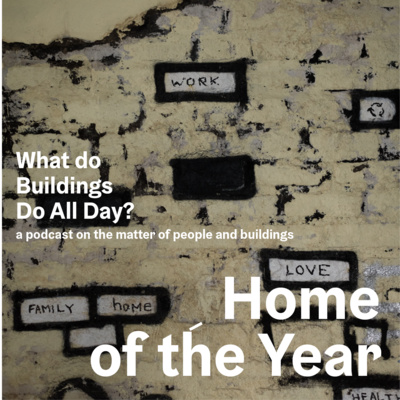
BONUS: Home of the Year
In this bonus episode of the podcast Emmett Scanlon offers some thoughts on the popular television show Home of the Year. Far from being passive entertainment, or a how-to-do-it program about making better homes, home-based lifestyle television shows become occasions for viewers to gain an understanding of what might be their shared national domestic identity. These tv shows thrive in societies where home-ownership, above all forms of other domestic tenure, is the most valued and celebrated housing ideology. Does Home of the Year reflect Ireland in 2021?
_
Music is by Sinead Finegan and played by the Delmaine String Quartet.
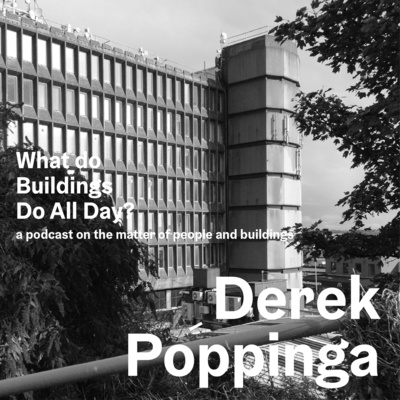
22. Derek Poppinga | DEVELOPMENT
About Derek Poppinga:
Derek co-founded Mm Capital, an Irish real estate investor and developer in 2013. He is currently developing out c.Eur500m of real estate spread across social housing, standard apartments and co-living to name a few areas. A qualified barrister, he previously worked in roles in Morgan Stanley, Bridgewater Associate and H.I.G. European Capital Partners, working on over €1Bn worth of real estate transactions in this time.
__
Music is by Sinead Finegan, played by the Delmaine String Quartet (Philip Dodd, leader).
The podcast was recorded on Zoom in March 2021.

21. Ben Channon | HEALTH
About Ben Channon:
Ben Channon is an architect, author, TEDx speaker and mental wellbeing advocate, and is well known in the industry as a thought leader in designing for happiness and wellbeing. He is a Director at wellbeing design consultancy Ekkist, where he helps clients and design teams to create healthier places, and researches how buildings and urban design can impact how we feel.
He developed an interest in design for mental health, wellbeing and happiness after suffering with anxiety problems in his mid-twenties. This led him to research the relationship between buildings and happiness, which formed the basis of his first book: Happy by Design. Ben now speaks on this subject to businesses and universities around the world.
Ben then went on to qualify as WELL Accredited Professional, broadening his knowledge to encompass design for physical wellbeing. In January 2020 he was invited to join the WELL Mind Advisory panel, using his expertise to raise the bar for healthy buildings worldwide.
In 2017 Ben co-founded the Architects’ Mental Wellbeing Forum, which is focused on improving mental health within the industry. He is also an accredited mindfulness practitioner with the Mindfulness Association, and is interested in how buildings can help us to be more mindful and present every day.

20. Eoin Ó Broin | ARCHITECTURE
In this episode Emmett Scanlon talks to Eoin Ó Broin about architecture, planning, participation and the public value of architecture. And a little about housing too.
About: Eoin Ó Broin:
Eoin Ó Broin is a Sinn Féin TD for Dublin Mid West and the party’s spokesperson for Housing, Local Government and Heritage. He has been a Sinn Féin activist for 22 years in Belfast and Dublin, was elected to Belfast City Council and South Dublin County Council and is author of a number of books including HOME: why public housing is the answer (Merrion Press 2019) and Defects: living with the legacy of the Celtic Tiger (Merrion Press 2021)
__
Music is by Sinead Finegan, played by the Delmaine String Quartet (Philip Dodd, leader).
The podcast was recorded on Zoom in February 2021.
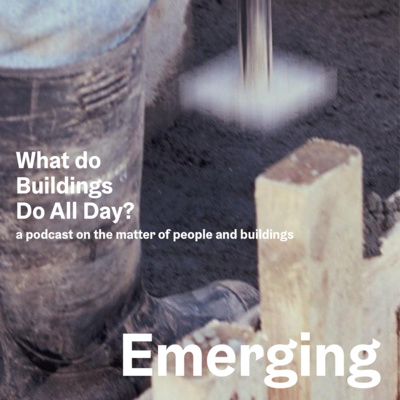
19. EMERGING POSITIONS | Noreile Breen | Tom O Brien | Jennifer O Donnell | Andrew O Murchu
In this episode, recorded on zoom from Dublin, Kerry, Berlin and Limerick, Emmett Scanlon speaks to Noreille Breen, Tom O Brien, Jennifer O Donnell and Andrew O Murchu. The conversation begins with the notion of architects being asked or expected to "take a position", with each architect in turn outlining how they begin a project but also their reaction to that notion of position-taking means in architecture. The quartet discuss the form and nature of their individual practices in architecture, their desire for public work, the possibility of architects contributing to wider strategic thinking and policy, and at what point architects might just have to stop producing.
About Noreile Breen | Noreile Breen studied architecture at the Dublin School of Architecture, DIT. She worked with Atelier Bow-Wow in Japan and Steve Larkin Architects before establishing her own practice which is based between Dublin and Kerry, Ireland. Her practice is focused on creating buildings which have a rich spatial character and are rooted in the built heritage of the Irish rural landscape.
About Tom O Brien | T O B Architect is an explorative, critical architectural practice based in Dublin and Co. Tipperary, Ireland. It was founded by Thomas O Brien in 2013 and since then has earned a reputation as an expansive practice that incorporates an ongoing examination of the complex inter-related nature of material things, humans, animals, and plants into each project. The practice has been recognised domestically and internationally, receiving an Architectural Association Award 2019 for Killan Farmhouse, and being shortlisted for the international Architectural Review Emerging Architect prize in 2018. Thomas has been supported by an Arts Council Bursary in 2020. Thomas is a Design Fellow at University College Dublin where he teaches in the first year studio.
.
About Jennifer O Donnell | Jennifer O’Donnell is an Irish architect, teaching assistant at the TU Braunschweig and founding partner at plattenbaustudio. Jennifer studied Architecture at University College Dublin, following which she worked for GKMP Architects and Sauerbruch Hutton Architects before founding her architecture practice Plattenbaustudio in Berlin in 2018, together with her partner Jonathan Janssens. Plattenbaustudio began with an idea about combining the practice of designing and building architecture with a sustained focus into the potential of architectural drawing as a tool for investigation and communication. Since then the studio has grown to specialise in the development of architectural drawings for research, for public and private clients, for exhibition and dissemination- run in tandem with their building projects. Plattenbaustudio's work has been exhibited at the Irish Museum of Modern Art, the London Festival of Design and the Irish Embassy in Berlin. Jennifer herself was awarded the AGA Gold Medal in Architecture upon her graduation from UCD Dublin in 2012, was the recipient of an Irish Arts Council Architecture Bursary Award in 2019.
.
About Andrew O Murchu | Andrew Ó’Murchú is a co-founder of BothAnd Group, with Kate Rushe, Alice Clarke, and Jarek Adamczuk. BothAnd Group is a collaborative research and spatial design practice that aims to understand the behaviour of living systems and deploys architecture as a methodology to look at the world. Andrew currently lectures in architecture at both TU Dublin and Ravensbourne University London. With Jarek Adamczuk, he was the recent recipient of the Arts Council’s ‘Next Generation Artist Award’.
__
Music is by Sinead Finegan, played by the Delmaine String Quartet (Philip Dodd, leader).
The podcast was recorded on Zoom in February 2021.

18. End of Year Show 4 | CITIES | Philip Lawton
This is the fourth and final episode of the End of Year Show. The End of Year Show is a look back on some of the things that happened and were discussed in architecture and built environment in 2020. Previous episodes covered housing, towns and culture and this episode focuses on the city. Emmett Scanlon is joined by Philip Lawton, urban geographer and researched at Trinity College Dublin. The topics covered included covid, inequality, how are we writing about and discussing the city, who the city is for, density, housing, and our tendency to compare cities.
__
Philip Lawton is an urban geographer. His research has examined the overlaps between urban transformation and the political economy of space and place. His published work has included the analysis of urban policy-making, the 'European city' as urbanist ideal, and residential transformations in both central and suburban locations. He is currently working on the link between early 20th Century ideals of the city and contemporary debates over urban transformation.
__
Music is by Sinead Finegan, played by the Delmaine String Quartet (Philip Dodd, leader).
The podcast was recorded on Zoom in January 2021.
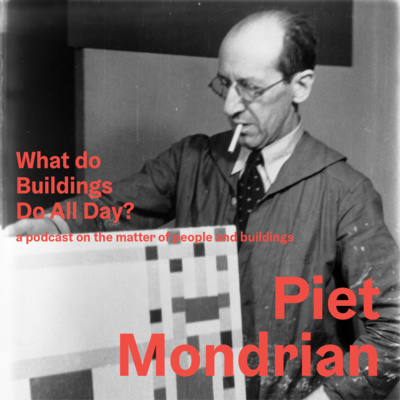
17. Piet Mondrian | Rooms for Manoeuvre | The artist and his studio.
This is a special edition of the podcast commissioned by the National Gallery of Ireland on the occasion of their Mondrian exhibition. In the podcast host Emmett Scanlon recalls his first encounters with Mondrian and then speaks to Professor Michael White from the University of York. Michael has researched, published and curated the work of Piet Mondrian. The podcast focuses on the role of the studio in the life and work of Mondrian and pays particular attention to the studio in Paris, at 26 Rue du Departs.
_
The podcast was recorded on zoom in December 2020.
_
Music is by Sinead Finnegan, played by the Delmain String Quartet. With thanks to Brina Murphy of the National Gallery of Ireland, and Simon Cullen.
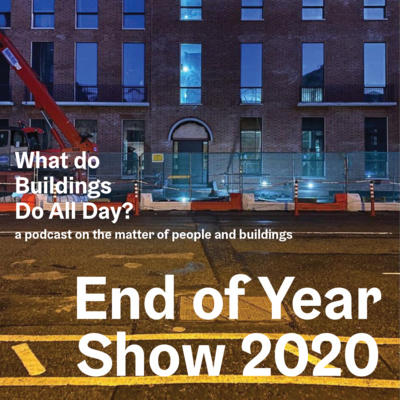
16. End of Year Show 3 | CULTURE | Michael Hayes
It is the End Of the Year Show 2020, Part 3, a look back at some key moments in architecture and design and the world in which they operate in Ireland in 2020. In this third episode Emmett talks to Michael Hayes about architecture culture in 2020. Having to move online had an impact on the way architecture is produced, discussed, taught and experienced. Nevertheless last year saw new forms of communication and engagement emerging, new groups in architecture forming, new books arriving and some exhibitions waiting.
__
Michael Hayes is an architect and Editor, of Architecture Ireland, the journal of the Royal Institute of Architects of Ireland.
__
Music is by Sinead Finegan, played by the Delmaine String Quartet (Philip Dodd, leader).
The podcast was recorded on Zoom in January 2020.
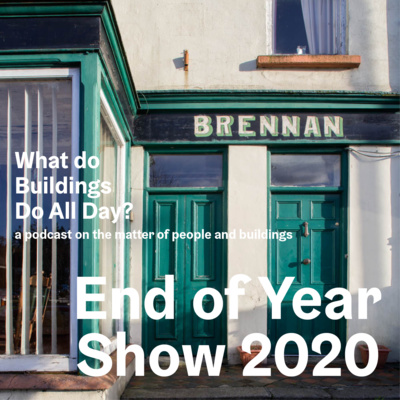
15. End of Year Show 2 | TOWNS | Miriam Delaney
It is the End Of the Year Show 2020, Part 2, a look back at some key moments in architecture and design and the world in which they operate in Ireland in 2020. In the second of four short episodes Emmett Scanlon talks to Miriam Delaney, architect and lecturer at TUD, Dublin. Miriam identifies some key initiatives, programs and events that took place in Ireland in 2020 that related to the town in Ireland. Photo is by Paul Tierney, courtesy of the photographer.
__
Miriam Delaney is an architect and lecturer in the Dublin School of Architecture, TUDublin. She has lectured and written widely on the issues facing Irish towns and has most recently been involved in political advocacy and community engagement in the field of rural town regeneration.
__
Music is by Sinead Finegan, played by the Delmaine String Quartet (Philip Dodd, leader).
The podcast was recorded on Zoom in December 2020.
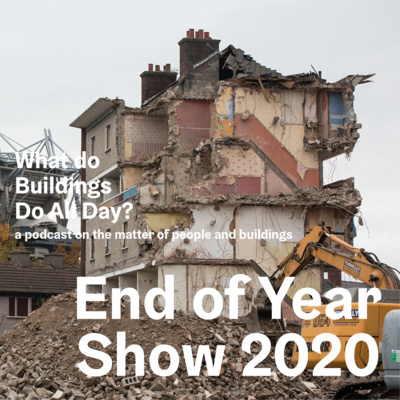
14. End of Year Show 1 | HOUSING | Lorcan Sirr
It is the End Of the Year Show 2020, a look back at some key moments in architecture and design and the world in which they operate in Ireland in 2020. In the first of four short episodes Emmett Scanlon talks to Dr. Lorcan Sirr, Senior Lecturer in Housing at TUD, Dublin. Lorcan identifies some key events that took place in housing in Ireland in 2020, from the formation of a new Government, to the arrival of a seventh Minister, to the ban on co-housing, the further financialisation of housing and a ray of hope from Europe.
__
Music is by Sinead Finegan, played by the Delmaine String Quartet (Philip Dodd, leader).
The podcast was recorded on Zoom.
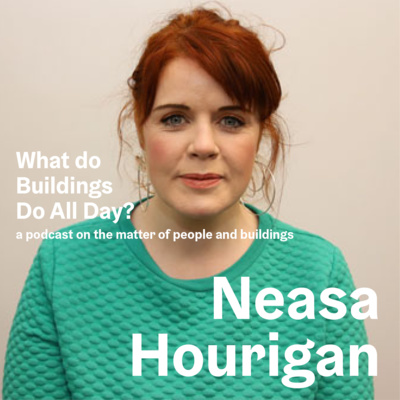
13. Neasa Hourigan | PUBLIC GOOD
This week host Emmett Scanlon talks to Neasa Hourigan. Neasa is the Green Party TD for Dublin Central. Neasa is Green Party Finance & Health Spokesperson and Chair of Policy Council for the party.. Neasa also studied architecture at TUD Dublin, did a Masters by research in University College Dublin , worked in practice in Dublin, and then went to Queens University in Belfast where she developed a specific interest in community engagement, working with students of architecture.
Neasa is member of a party which is, at the time of recording, in Government in Ireland and since being elected for the first time as a member of the Dail in early 2020, Neasa Hourigan has had several moments when she has stood squarely against the politically whipped policies of her party. In a pretty wide ranging conversation Nessa talks about her move from architecture into politics and how that happened at a personal and professional level. We talk about education in architecture and learning how to put it all on the table for debate; Nessa talks about forming policy and programs for Government; We talk bollards and doorsteps as a means to change hearts and minds, what campaigning for Repeal does to a person; And of course the conversation turns to housing, the value of a referendum on the right to house and if the Department of Housing is fit for purpose.
__
Neasa Hourigan is the Green Party TD for Dublin Central (formally councillor for Cabra-Glasnevin). Neasa is Green Party Finance & Health Spokesperson and Chair of Policy Council. She has a professional background as a specialist in creating sustainable communities and was a university lecturer in environmental development and design. She and her family have lived in Cabra, Dublin 7 for 15 years.
__
Music is by Sinead Finegan, played by the Delmaine String Quartet (Philip Dodd, leader).
The podcast was recorded on Zoom.
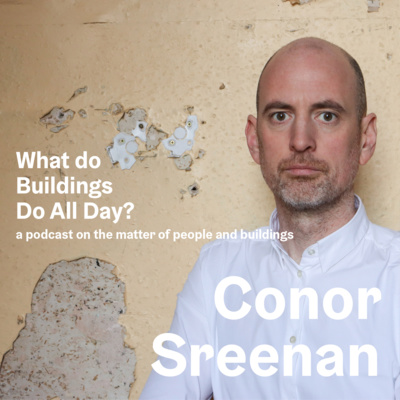
12. Conor Sreenan | PUBLIC GOOD
In this episode Emmett Scanlon talks to Conor Sreenan. Conor is the Director of Strategy & Design at Grangegorman Development Agency. Conor's work involves being involved with a dizzying array of design and building projects across this part of Dublin. The Grangegorman Development area is a significant part of Dublin - it stretches from the Phoenix park in the West, to Dorset Street in the west, into Cabra and Phibsborough on the North and down to the river Liffey quays in the south. Much of the building work though is centred on the old Grangegorman Campus hospital and a whole series of new buildings for a range of uses is under construction there. Conor moved to the Agency from Heneghan Peng, one of Ireland’s most well know architecture practices, they are the architects who worked on the recent refurbishment of the National Gallery and the last project Conor worked on at that practice was the Museum of Palestine. Avid listenings to the podcast would know Conor wrote a piece about that building t under the Building Me Building You strand of this podcast, and that text was called Building Palestine in which he beautifully sets the scene for the construction site of this project, in Palestine. Conor talks about the move from so-called private to public practice and indeed this anchors much of what we discuss, this artificial binary between the two strands of architecture endeavour and the idea of working for the public good. We start though with the text, and I asked Conor why he wrote it and what it meant.
The podcast was recorded on zoom. The bin collection is real.
__
Conor Sreenan graduated from University College Dublin in 2001, with an honours degree in Architecture. In 2006 he received a Postgraduate Diploma in Professional Practice and Management, since which time he has been a registered architect.
Following graduation he joined O’Donnell + Tuomey Architects as a Project Architect to oversee the design and construction of the Press Auditorium at Dáil Éireann, Irish Government Buildings, Dublin. This project received awards from the Architectural Association of Ireland (2003) & the Royal Institute of the Architects of Ireland (2003).
In 2004 he accepted a position with Heneghan Peng Architects, remaining there for 13 years. In that time he led teams across public and private sector projects, including the delivery (2016) of the Palestinian Museum, Ramallah, West Bank of Palestine. The project was a recipient of the Royal Institute of the Architects of Ireland President’s Award (2017). The Museum was listed for the Royal Institute of British Architects International Prize (2018), and in 2019 the Museum received the Aga Khan Award for Architecture.
In Spring 2018 he was appointed as a Director of the Grangegorman Development Agency, with responsibility for Strategy and Design.
As part one of the diverse Agency team, and with a variety of design teams and building contractors, he supports the implementation of the Grangegorman Masterplan (c.30ha) for multiple stakeholders. These stakeholders include the Health Service Executive, Technological University Dublin, the Department of Further and Higher Education, Research, Innovation and Science, and utimately the existing and emerging communities within the Grangegorman neighbourhood.
__
Music is by Sinead Finegan, played by the Delmaine String Quartet (Philip Dodd, leader).
The podcast was recorded on Zoom.
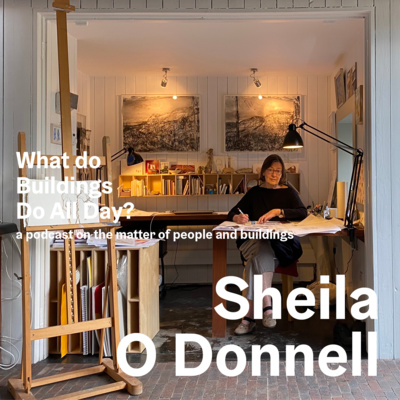
11. Sheila O' Donnell | HOUSES
In this episode host Emmett Scanlon talks to Sheila O Donnell, one of Ireland’s most celebrated architects. With John Tuomey, Sheila has been running their practice O Donnell+Tuomey in Dublin for over 30 years.
The practice have designed and built theatres, cinemans, primary schools, university buildings, libraries, student centres, bridges, art galleries - It is impossible to summarise there their achievement and influence on architecture culture and discourse in Ireland and around the world, and in 2015 the pair were awarded the Royal Gold Medal in London one of architecture’s highest awards.
The conversation with Sheila though was triggered by the death earlier this year of writer, cartographer and publishers Tim Robinson and Mairead Robinson who were based in Roundstone in Galway. Sheila and John were good friends of Mairead and Time and Sheila is now involved in the campaign to hold this house and its place for future use. During the conversation Sheila talks about the house as she had experienced it, what it was like, and from there the conversation moves to thinking about houses as dynamic, unfixed things, to Tim’s own writing on the house, to working with old buildings, to theatre design, to how designing housing would be a pinnacle in Sheila’s career and more.
Sheila was intrigued though by the question of what it is that buildings do al day, and it is right there, that the conversation began.
___
O’Donnell + Tuomey is a studio-based practice, with offices in Dublin, Cork and London. Committed to the craft and culture of architecture, they have been involved with urban design, cultural, social and educational projects at home and abroad. The practice has an international reputation for its engagement with complex urban situations and sensitive landscapes. They have completed schools and university buildings, theatres and cinemas, community centres and social housing, art galleries and libraries in Ireland, the UK and on the European mainland. Winners of more than 120 awards, recent buildings include the Glucksman Gallery Cork, Timberyard Housing Dublin, Irish Language Centre Derry, Sean O’Casey Community Centre Dublin, Lyric Theatre Belfast, Photographers’ Gallery London, LSE Student Centre and the Central European University Budapest. They have exhibited six times at the Venice Architecture Biennale, with installations which advance their research into the useful beauty and poetic purpose of architecture, exploring areas of overlap with other art forms.
Sheila O’Donnell graduated from University College Dublin in 1976, when she moved to London. In 1980 she was awarded an MA in Environmental Design from the Royal College of Art London. She worked for Spence and Webster, Colquhoun and Miller and James Stirling before returning to Dublin to teach at UCD and set up her practice. She co-founded O’Donnell + Tuomey in 1988. She is a Practice Professor in Architecture at University College Dublin. She has taught and lectured at schools of Architecture in Europe, Japan and the USA, including the AA, Cambridge, Princeton and Harvard GSD. Her watercolours have been exhibited in the Royal Academy and the Royal Irish Academy. In 2009 she was elected a member of Aosdána, the affiliation of Irish artists.
In 2015 she was joint recipient with John Tuomey of the RIBA Royal Gold Medal and the American Academy of Arts and Letters Brunner Prize, both awarded in recognition of a lifetime’s work.
Sheila was named Architect of the Year at the 2019 Women in Architecture (WIA) Awards for her work on the Central European University in Budapest, Hungary.
___
Music is by Sinead Finegan, played by the Delmaine String Quartet (Philip Dodd, leader).
The podcast was recorded on Zoom.
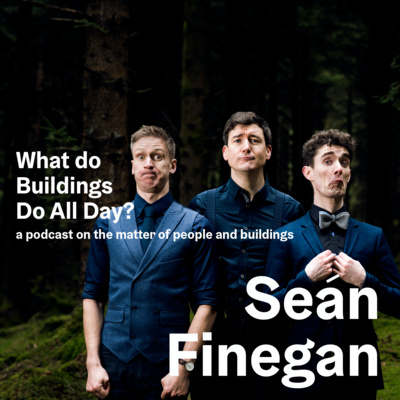
10. Sean Finegan | ROOMS
In this episode host Emmett Scanlon talk to Sean Finegan, a comedian who is one part of the very successful and very funny comedy trio Foil Arms and Hogg. Now together for 12 years, the men found each other and began working together in the concrete bowels of the Belfield campus in University College Dublin. At the time Sean was studying architecture but on the Richview campus, a twenty minute walk or so from the drama society where Sean tells me he found himself hanging out more that he thought he should, choosing drama over drawing, strutting over structures.
Recorded from a room he recently built at the back of his house with architect Ryan Kennihan, Sean talks about his time studying architecture, working with an architect on the design of his house, he recalls the atmosphere of design crits in college, how to be critical to be kind when working with other people and how Dermot Bannon just might be untouchable when it comes to sketch comedy.
Remember if you like and enjoy the podcast the simple way to support it is to rate it on iTunes and share it far and wide on social media.
Music by Sinead Finegan, used with permission. Played by the Delmaine String Quartet, recorded in Trinity College Dublin.
The conversation was recorded online.

9. Hari Phillips | HOUSING
In this episode Emmett Scanlon talks to Hari Phillips in London. Hari tells his side of the story about one housing project he and his architecture practice completed in 2018 on the Kipling Estate in London. It is a fascinating story of community initiative, ambition, local authority support and clear commitment and dedication by the architects and all involved to make solid, sustainable housing that felt like it was alway there but would ensure the resident community would thrive long into the future.
Hari co-founded Bell Phillips Architects with Tim Bell in 2004 after winning an international design competition to carry out a major housing estate refurbishment project in East London. The architecture practice has developed a strong reputation for working with public sector clients to deliver outstanding housing and community buildings, with particular experienced in delivering schemes through collaborative community and stakeholder engagement. One such project is Marklake Court, a community-led affordable housing scheme built on the site of an underused garage block in Southwark, heralded by The Guardian as "a beacon for the delivery of low cost housing across the capital”.
Music is by Sinead Finnegan, played by the Delmaine Sting Quartet.
This conversation was recorded online.
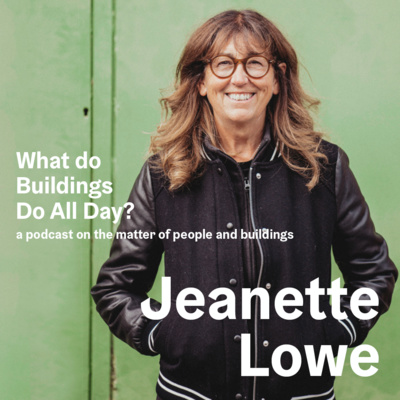
8. Jeanette Lowe | HOUSING
In this episode, Emmett Scanlon talks to Jeanette Lowe. Jeanette is a photographer based in Dublin. The conversation is about architecture, housing and the people that live in it, specifically Pearse House, a housing scheme designed by Herbert Simms and built between 1935-40 in Dublin. Jeanette begins by talking about her work as part of RTE Illuminations, in which she photographed what she calls, the "invisible front line", workers who have gone out to work right through lockdown and Covid-19 and who also live in Pearse Flats. Jeanette was born and lives in Dublin, Ireland. Her work has been exhibited in Ireland and internationally and is held in Irish and international collections. Her artistic practice explores the relationship between people, place and culture with an emphasis on communities in inner-city Dublin. She is currently Artist in Residence at the National Maternity Hospital, Holles St., Dublin and continues to work on her personal projects.
Music is by Irish composer Sinead Finnegan and is used with permission. Copyright reserved. The piece, Précis, is written for string quartet and is performed by the Delmaine String Quartet.
The piece was recorded live in the Chapel in Trinity, December 2018 at a concert hosted by Mellow Tonics choir. Due to Covid-19 restrictions this conversation was recorded online.

7. Shane O' Toole | GROUP 91
In this episode host Emmett Scanlon, talks to architecture critic Shane O' Toole. Back in the 1980s a group of young and eager architects began working together in a loose collective, anxious to make things happen in Dublin city. By 1991, this group formalised as Group 91 and contained among others, Shelley McNamra, Yvonne Farrell (Grafton Architects), John Tuomey and Sheila O Donnell, Mc Cullough Mulvin architects and McGarry NiEanaigh. As we approach the 30th anniversary of Group 91, the conversation begins with Shane recalling how he and he colleagues set it up and how they went about initiating and then winning the ground breaking and landmark design competition for Temple Bar in Dublin, a moment in our urban history, and, as one critic put it, that put Irish architecture finally on the public mind. Shane talks about how he was involved in the design and construction of the Ark, the cultural centre for children and the adjoining arch in Temple Bar as part of Group 91. The conversation moves to Shane's career as a critic for the Sunday Times, becoming a writer, hunting down the stories of Irish architects and his work as an advocate for Irish architecture in Europe and beyond.
Music is by Rachael Lavelle. If you enjoy the podcast please rate it on iTunes.
Shane O’Toole is an award-winning architectural critic and no longer practicing as an architect. A graduate in architecture from UCD and current Adjunct Associate Professor at the UCD School of Architecture, Planning & Environmental Policy.
An honorary member of the AAI, he has served the profession as President of the AAI, Vice President of the RIAI, inaugural director of the Irish Architecture Foundation, Commissioner for the Venice Biennale and jury member of the Mies van der Rohe Award for contemporary European architecture. He co-founded DoCoMoMo International and DoCoMoMo Ireland, the heritage bodies, and is Chairman of the Irish Architectural Archive’s Collections Development Committee. He was a founder member of Group 91 Architects. He reintroduced the Downes Medal as the AAI’s premier award and established its annual international critic’s lecture programme.
He has co-edited monographs on Kevin Roche and Aldo Rossi, and curated exhibitions on Michael Scott, Liam McCormick and Noel Moffett, among others. He contributed to the pilot inventory of 20th-century architecture in Dublin. He wrote for The Sunday Times for ten years. A member of CICA, the International Committee of Architecture Critics, he was named International Building Press Architecture Writer of the Year in 2008, 2009 and 2010. Gandon also published a collection of his critical essays, 101 Hosannas for Architecture, in 2018.
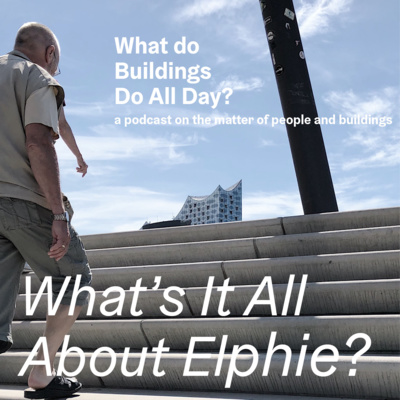
BONUS: What's It All About Elphie?
This is a bonus edition of the podcast What Do Buildings Do All Day? In this second bonus episode you will hear a text written by host Emmett Scanlon following a visit to the Elbephilarmonie in Hamburg, in June 2018. "What's It All About Elphie?" is read by actor Ste Murray.
Building Me, Building You is the title of this occasional bonus edition of the main long-form podcast. New writings on encounters with or stories of living in or with buildings will be read by the authors themselves or by others on their behalf. If you wish to submit a text for consideration for future editions of the podcast, please get in touch with us at whatdobuildingsdoallday@gmail.com.
Thanks for listening. Podcast music is by Rachael Lavelle.
Podcast contains an extract of, Richard Wagner: The Ring Without Words (arr. Lorin Maazel). Played by the World Doctors Orchestra, Stefan Willich, conductor Live recording 29th June 2018 Elbphilharmonie Hamburg, Germany. Video Editing: Matthias Füg and Mhoch4 (www.mhoch4.com) Audio Recording: Parry Audio Studio (www.parry-audio.de) Audio Mastering: Martin Schlaud (www.mcs-mastering.de). Reproduced with permission, all copyright remains with the World Doctors Orchestra / the authors.

6. COSMOFORM | Eamonn Hall + Cormac Murray
In this episode, Emmett Scanlon talks to Eamonn Hall and Cormac Murray about their new publication COSMOFORM. This is a 'zine on the Met Eireann Building in Glasnevin, Dublin 9 by architect Liam McCormick. During the conversation, we hear some of the history of this building and how the architect was influenced by the work of Swiss architect, Justus Dahinden. This leads to a conversation on how one might make books about buildings and the death (or not) of print publications. We also hear about their first publication, The Forgotten Frontier, a study of the infamous Phibsborough Shopping Centre, in Dublin 7.
Eamonn Hall is a Dublin based graphic designer and art director. He is the founder of Phibsboro Press, an independent publishing imprint focused on architecture, photography and design. He is also the lead designer at EHGD (ehgd.xyz), a small design studio based in Cabra. Eamonn's work is focused on branding, logo design, print production and web design.
Cormac Murray is an Irish architect and writer based in Toronto. In addition to his two essays for the Phibsboro Press, he has edited and published numerous essays and reviews for Irish Architectural publications and has co-authored a book: The Dublin Architecture Guide 1947-2014 with Paul Kelly and Brendan Spierin.
Both 'zines are available for purchase at Phibsboro Press. Support Irish Design!
Podcast music by Rachel Lavelle. This episode was recorded using ZOOM.
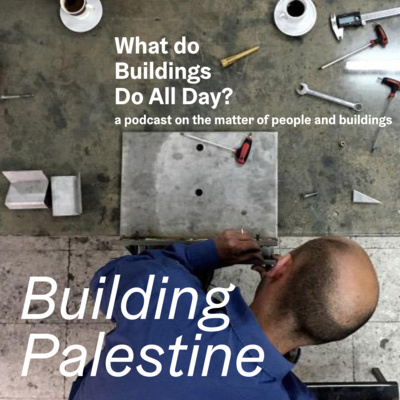
BONUS: Building Palestine
This is a bonus edition of the podcast What Do Buildings Do All Day? In this first bonus episode you will hear a text by Conor Sreenan, read by actor Ste Murray. Building Me, Building You is the title of this occasional bonus edition of the main long-form podcast. New writings on encounters with or stories of living in or with buildings will be read by the authors themselves or by others on their behalf. If you wish to submit a text for consideration for future editions of the podcast, please listen to the end and get in touch with us at whatdobuildingsdoallday@gmail.com. Thanks for listening. Music is by Rachael Lavelle.
Conor Sreenan is a Director of the Grangegorman Development Agency, with responsibility for Strategy & Design. From 2004-2017 he worked with heneghan peng architects. The Palestinian Musuem was designed by heneghan peng architects for Taawon (Welfare Association), and built by Tubaila Target United and Consolidated Contractors Co.
Image Title: Feras Tubaila, Nablus Workshop, Palestine, taken by Conor Sreenan.

5. Adrian Duncan
Adrian Duncan is an artist and award-winning writer based in Ireland and Berlin. In this podcast, a recorded conversation between Dublin and Berlin, Adrian talks to Emmett Scanlon about bungalows, building sites, books and Berlin. Two excerpts from his debut novel are read by actor Ste Murray.
Adrian's debut novel Love Notes from a German Building Site was published by The Lilliput Press and Head of Zeus in 2019. It won the 2019 John McGahern Book Prize. In 2020 he was shortlisted for the Dalkey Literary Awards Emerging Writer. His second novel A Sabbatical in Leipzig was published by The Lilliput Press in 2020.
In 2018 he exhibited, in collaboration with Feargal Ward, a large-scale film/sculptural installation work titled The Soil Became Scandinavian, as part of EVA 2018, curated by Inti Guerrero. In 2019 they co-directed a music video for Joy Division's Day of the Lords as part of the Unknown Pleasures Reimagined project. In 2020 his and Ward's film Tension Structures received its North American premier at Hot Docs, Toronto.
From 1995 Adrian studied and worked as a structural engineer for over a decade in the U.K. and Ireland. He received his chartership from the I.E.I. (Irish Engineering Institute) in 2007, before returning to study fine art at IADT, Dún Laoghaire in 2008. He received a 1st class M.A. (Art in the Contemporary World, NCAD, Dublin) in 2011. He has guest tutored and guest lectured at UCD School of Architecture, Dublin; UCC School of Architecture, Cork; NCAD, Dublin; and Crawford College of Art, Cork.
He is coeditor of Paper Visual Art Journal (IRL/DE).
Podcast music by Rachel Lavelle. Reading by Ste Murray. Book extracts reproduced and used by kind permission of the author.

4. Valerie Mulvin + Ruth O' Herlihy | McCullough Mulvin Architects
In this episode, host Emmett Scanlon speaks to Valerie Mulvin and Ruth O Herlihy of McCullough Mulvin Architects based in Dublin, Ireland. The pair, together with Niall Mc Cullough and Corán O’Connor, lead the team for the Thapar University Project, in the Punjab, India. The final project, completed in late 2019, is a series of buildings, and a total of almost 1 million square feet of rooms, arranged is a series of red forms, a total distance of 1.5km apart, conceived of as a new social, spatial and material anchor for the teaching and learning community there.
Ruth and Valerie talk about how the commission arrived into the office, how they worked, what the core ideas of the project were and what the lasting impact of working on a project like this has on them professionally and personally. Finally they move from Thapar in India to Towns in Ireland, and discuss the recent program for Government, paying particular attention to the future of towns.
McCullough Mulvin Architects won a commission in 2015 for the design of extensive new university buildings for Thapar University in Patiala. The university is situated on a 250 acre campus 350km north of Delhi.
The university had already commenced a plan of contemporisation for their academic progammes and in travelling the world to make these academic connections, realized that buildings are critical to the life of universities and that the “university as destination” concept is a significant factor in how people make their decisions for an educational trajectory. The commission was described as being for “iconic buildings”.
The brief for the project comprised a programme of 1,000,000sqft – an ambitious body of work to be constructed and delivered within a very short timeframe. It included an academic hub, comprising a library, a computer science faculty and a series of lecture theatres ranging in size from 150 person to 500 person. This complex was to be supported by the delivery of student accommodation to house 2500 students as well as other ancillary faculty buildings.
McCullough Mulvin worked with Design Plus Architects in Delhi as well as a full design team in India and ARUP consulting engineers in Dublin to design and deliver the buildings which resulted in a significant enhancement of the existing campus. Throughout the course of the project, the architects travelled over to India many times each year – at certain times on a once a month basis, to oversee the design and execution of the project. The living accommodation was completed in August 2017, the Learning Laboratory (the academic hub) in October 2019.
Music by Rachel Lavelle. Photography Christian Richters.
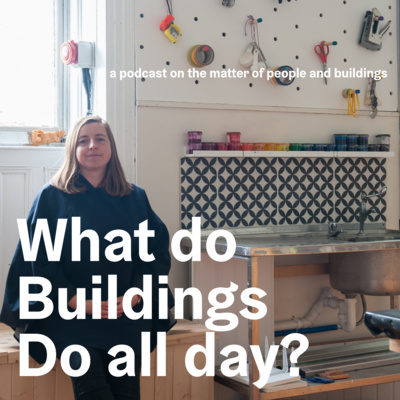
3. Rosie Lynch | Callan Workhouse Union | COLLABORATION
In this concluding episode of a three part podcast introduction on collaboration in architecture, design and space making, host Emmett Scanlon talks to Rosie Lynch, the Creative Director of Callan Workhouse Union. They speak at length about one project, Nimble Spaces - New Cultures of Housing. This is an ongoing housing project being made in Callan for and in collaboration with the Camphill Community. Rosie describes the research process of inventing new methods to discuss and debate and eventually design homes, working with a range of artists and architects. This data is gathered and then translated into a housing project for 26 residents which is due for construction in 2021. The project highlights that new ways and means are necessarily needed when we seek to offer agency and a voice to those often excluded from processes of spatial provision and design. Drawings and models and the usual language of architecture often fail in new participatory planning processes. Situated in the former Workhouse in Callan, the building is now home to an array of local and civic functions and uses, reappropriating this building in new ways into the lives of those who live and work in Callan. Music is by Rachael Lavelle.

2. Jeffrey Bolhuis + Laurence Lord | AP+E | COLLABORATION
Laurence Lord and Jeffrey Bolhuis together run AP+E, (Architecture, Practice and Experimentation), an architecture office based in Ireland and The Netherlands. The office has a strong interest in the social and cultural value of architecture and has gained a reputation for working internationally on a wide range of cultural, educational, residential projects as well as completing innovative urban and regional development studies, research projects and significant exhibitions. Among other topics, this conversation between the architects and host Emmett Scanlon, covers their involvement in FREE MARKET, the national pavilion of Ireland at the 2018 Venice Biennale, the potency of the exhibition in architecture and how their practice is structured to seek and support collaboration from an ever expanding network. Laurence is a Lecturer at Queens University Belfast and Jeffrey teachers architecture at the Cork Centre for Architectural Education and the T.U. Delft.
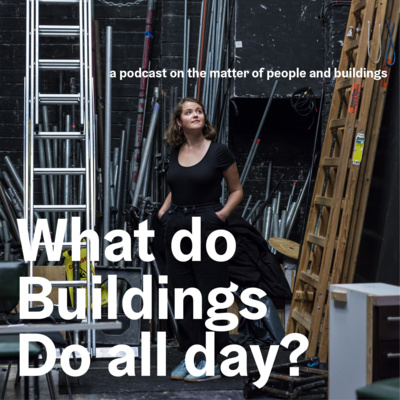
1. Molly O Cathain | COLLABORATION
Molly O Cathain is a Swedish-Irish Set and Costume designer based in London and a co-founder of MALAPROP Theatre. In this episode, recorded in lockdown, Molly discusses with host Emmett Scanlon, her new realationship to home emerging in lockdown and through over fifty days of creative collaboration with her parents, recreating works of art and sharing them with audiences around the world online. Molly also talks design, collaboration, architecture and her time spent working in the bastion of theatre and architecture, the National Theatre in London. Music is by Rachael Lavelle.

TRAILER - What Do Buildings Do All Day?
Buildings are everywhere and right now we have never been more aware of the built world around us.
But what are the stories of our buildings – who designs them, who pays for them, who uses them – why do some buildings survive and other buildings die and why do some buildings become sites of protest or others get attached to our very identities?
In this new podcast host Emmett Scanlon is going to be talking to all kinds of people about the buildings that matter to them.
He also talks to the buildings themselves to record their stories so we can understand what is it that buildings do all day in our lives and in our imaginations.
Music by Rachel Lavelle